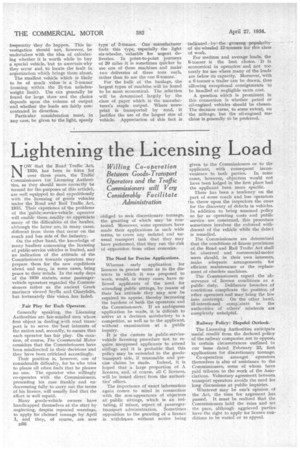Lightening the Licensing Load
Page 122

If you've noticed an error in this article please click here to report it so we can fix it.
NOW that the Road Traffic -Act, 1930, has been in force for over three years, the Traffic. Commissioners (or Licensing Authorities, as they should more correctly be termed for the purposes, of this article), are well equipped to deal expeditiously with the licensing of goods vehicles under the Road and Rail Traffic Act,, 1933. Their experience of the problems of the public-service-vehicle operator will enable them readily to appreciate many of the difficulties of the haulier, although the latter are, in many cases, different from thoSe that occur on the coach and bus side of the industry.
On the other hand, the knowledge of many hauliers concerning the licensing of public-service vehicles is limited, and an indication of the attitude of the Commissioners towards operators may prepare them for the new conditions ahead and may, in some cases, bring peace to their minds. In the early days of the 1930 statute, some passengervehicle operators regarded the Commissioners rather as the ancient Greek mariners viewed Scylla and Charybdis, but fortunately this vision has faded.
Fair Play for Each Operator.
Generally speaking, the Licensing Authorities are fair-minded men whose first object in dealing with road transport is to serve the best interests of the nation and, secondly, to ensure that each operator has fair play. On occasion, of course, The Commercial Motor considers that the Commissioners have been misdirected in their decisions and they have been criticized accordingly.
Their position is, however, one of considerable difficulty, for he who tries to please all often finds that he pleases no one. The operator who willingly co-operates with the Commissioners, presenting his case frankly and endeavouring fully to carry out the terms of his licence, will usually find that the effort is well repaid.
Many goods-vehicle owners have handicapped themselves at the start by neglecting, despite repeated svarninas, to apply for claimed tonnage by April 1, and they, of course, are now D56 obliged to seek discretionary tonnage, the granting of which may be contested. Moreover, some operators have made their applications in such wide terms, to cover any isolated and unusual transport task that they may have performed, that they run the risk of opposition from other concerns.
The Need for Precise Applications.
Whereas early application for licences in precise terms as to the districts in which it was proposed to work, would, in many cases, have relieved applicants of the need for attending public sittings, by reason of their lax attitude they may now be required to appear, thereby increasing the burdens of both the operators and the Commissioners. If an ambiguous application be made, it is difficult to arrive at a decision satisfactory to a competitor, as well as to the applicant, without examination at a public inquiry.
It is the custom in public-servicevehicle licensing procedure not to require unopposed applicants to attend sittings and it is probable that this policy may be extended to the goodstransport side, if reasonable and precise claims be made. Indeed, it is hoped that a large proportion of A licences, and, of course, all C licences, will be issued direct from the authorities' offices.
The importance of exact information again comes to mind in connection with the non-appearance of objectors at public sittings, which is an irritating, if minor, aspect of passengertransport administration. Sometimes opposition to the granting of a licence is withdrawn without notice being given to the Commissioners or to the applicant, with consequent inconvenience to both parties. In some cases, however, objection would not have been lodged in the first place had the applicant been more specific.
There has been a tendency on the part of some coach and bas operators Ito throw upon the inspectors the onus for the discovery of defects in vehicles. In addition to being unsound policy so far as operating costs and public service are concerned, this procedure sometimes involves the enforced withdrawal of the vehicle while the defect is remedied.
The Commissioners are determined that the conditions of fitness provisions of the Road and Rail Traffic Act shall be observed and commercial-motor users should, in their own interests, make adequate arrangements for efficient maintenance or the replacement of obsolete machines.
The Commissioners regard theobservance of licence conditions as a public duty. Deliberate breaches of conditions complicate the position of other operators and may bring the law into contempt. On the other hand, ill-intentioned comp:aints to the authorities of others' misdeeds are completely unhelpful.
Railway Policy: Hopeful Outlook.
The Licensing Authorities anticipate useful results from the declared policy of the railway companies not to oppose, in certain circumstances outlined in our issue dated February 23, first applications for discretionary tonnage.
Co-operation amongst operators themselves is also of assistance to the Commissioners, some of whom have paid tributes to the work of the Associations. Voluntary agreement between transport operators avoids the need for long discussions at public inquiries.
Whatevet may be one's opinion of the Act, the time for argument has passed. It must be realized that the Commissioners hold the reins and set the pace, although aggrieved parties have the right to apply for licence conditions to be varied or to appeal.




















































































































































































